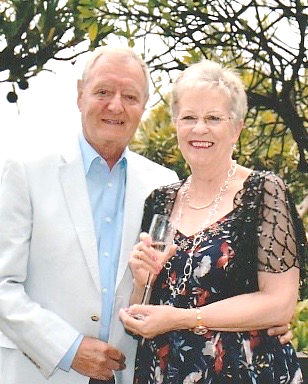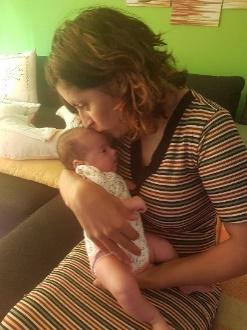A continuation of Fr. Bernardino’s column from two weeks ago about his recent trip to England…
fig. 1Neil and Dena Spence – hosting a cheese and wine party for “people helping people”.
When I was growing up I was surprised that in Portugal after Weddings or when big personalities visited the country, they would meet for a «Glass of Water». It took some time for me to discover that a “Glass of Water” meant to be a big and luxurious banquet. In England «Cheese and Wine» if I understood well, means a gathering of friends where food is served in a non-formal way. No special chairs for special people but simple food being served to people who could find a chair or be standing, drinking, eating and mainly socializing with one another.
Guess what! My hosts Neil and Dena Spence planned a «Cheese and Wine» gathering for July 26th. It sounded «normal». What happened «above» the normal was that gathering for «Cheese and Wine» meant to be a fundraiser event for the poor being helped by the project «People Helping People». From that gathering I could bring 555 Euros. I brought that money to Funchal on Monday, July 30th.
The following day when I was on my way to deposit that money in the Bank I received a very angry telephone call from a frustrated lady in charge of coordinating the distribution of the services and the money to the poor. She was very upset because this man had been ringing her house door bell, very early in the morning, when she was still in bed. This man was desperately asking for help.
Hunger has no rules, especially when children are involved… when there is hunger and no food, illness and no medicine, babies and no nappies. The man had come from far away. He had walked for an hour and a half to be able to catch a lift to Funchal. People Helping People wants to be an open door when all the other doors close. That’s the price we have to pay in our combat against bureaucracy and social inequality.
Pope Francis says that the poor are our doormen to heaven. Jesus says that “Whatever you do for the least of my children you do it unto me” (Math. 25). This lady in America was sleeping in her old car in the city of Concord, California. The police officer, who was a woman, knocked at the window of her car and told her that she had to move. It was illegal to sleep in cars inside the boundaries of that city. The city of Concord was distant from my city only about 20 minutes.
She rang the bell of my Parish residence asking me if I would give her permission to park her car in the huge parking lot of my Parish. Of course she got something better than a car to rest for the night. We spent some time together listening to her pain and frustrations and agony for being poor. At a certain point she said something that was “nailed” in me forever. What she said was: “This country is in a war against the poor”. I closed my eyes and said “I wish it was this country only”. But it is not true. Actually, the whole world is in a war against the poor.
One of Mother Teresa’s sayings that has been guiding «People Helping People» is: “WHEN YOU START BY JUDGING YOU HAVE NO TIME TO LOVE”.
From all our hearts to the people who gathered in the Spence’s family house for “Cheese and wine” here is our sincere and deep gratitude. I hope you don’t mind that I mention your names. It is for you that I will offer the Celebration of the Eucharist this coming Sunday.
Thanks to: Barry and Heather, Elizabeth and Nick, Ivan and Geraldine, John and Jenny, Robin and Rosemary, John, Ben, Trish and Jim, Julie and Doug, Nicola and Gavin, Chris, Eric and Jeanette, Kirstie and Sam. And last but not least, Jack and Lilly (my favourite English Angels).
Love and Peace,
Fr. Bernardino Andrade
(bernardinodandrade@gmail.com)

